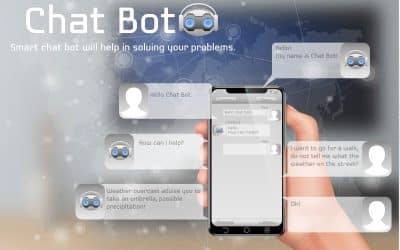In recent years, the integration of Artificial Intelligence (AI) into healthcare systems has ushered in a transformative era, revolutionizing the landscape of patient care and diagnostics. This intersection of cutting-edge technology and medical science holds the promise of enhancing the quality, efficiency, and accessibility of healthcare services.
AI’s profound impact is evident in its ability to bolster diagnostic accuracy through advanced algorithms, enabling healthcare professionals to make more informed decisions. From personalized treatment plans based on machine learning insights to the automation of administrative tasks, AI is streamlining processes and improving overall healthcare outcomes. This paradigm shift extends to the early detection of diseases, predictive analytics for patient outcomes, and the development of innovative telehealth solutions.
However, with these advancements come ethical considerations, data security challenges, and the need for ongoing professional education. This introduction sets the stage for exploring the multifaceted role of artificial intelligence development in healthcare, delving into its applications, benefits, and the critical considerations that accompany this groundbreaking integration.
Enhancing Diagnostic Accuracy with AI Algorithms
The realm of healthcare is undergoing a profound transformation propelled by the integration of Artificial Intelligence (AI) algorithms, notably in the enhancement of diagnostic accuracy. AI’s ability to analyze vast datasets with remarkable speed and precision has proven instrumental in revolutionizing the diagnostic process. Machine learning algorithms, trained on diverse medical data, enable healthcare professionals to decipher complex patterns and identify subtle abnormalities that might elude the human eye. This capability is particularly prominent in medical imaging, where AI systems excel in interpreting radiological scans, pathology slides, and other visual diagnostic modalities. The nuanced analysis provided by AI not only expedites the diagnostic timeline but also significantly reduces the margin of error, thereby enhancing overall accuracy.
Moreover, AI algorithms continuously learn and adapt from new data inputs, allowing for a dynamic and evolving diagnostic framework. This adaptability is crucial in staying abreast of emerging medical knowledge and refining diagnostic criteria over time. The integration of AI in diagnostics extends beyond image interpretation, encompassing a wide array of clinical data, including patient history, genetic information, and real-time physiological parameters. By amalgamating diverse data sources, AI algorithms contribute to a more comprehensive understanding of individual patient profiles, facilitating more personalized and targeted diagnostic approaches.
As these algorithms evolve and become more sophisticated, they hold the potential to revolutionize disease identification, prognosis, and treatment planning, ultimately advancing the precision and efficacy of healthcare delivery. The synergy between human expertise and AI algorithms marks a paradigm shift in diagnostic capabilities, promising a future where healthcare professionals can harness the full power of technology to provide accurate, timely, and tailored diagnostic interventions.
AI-powered Imaging for Precise Medical Diagnoses
The integration of Artificial Intelligence (AI) into medical imaging represents a groundbreaking leap in the quest for precise and efficient diagnoses. AI-powered imaging technologies have demonstrated unparalleled capabilities in revolutionizing medical diagnostics, particularly in the realms of radiology and pathology. Through advanced machine learning algorithms, AI analyzes complex visual data with unprecedented speed and accuracy, enabling healthcare professionals to uncover intricate patterns and subtle anomalies that might elude the human eye. In radiology, for instance, AI algorithms excel in interpreting intricate details within X-rays, MRIs, and CT scans, providing a level of precision that enhances diagnostic certainty. Pathologists benefit from AI’s prowess in scrutinizing pathology slides, aiding in the swift and accurate identification of microscopic abnormalities.
The real-time processing and analysis capabilities of AI significantly expedite the diagnostic workflow, offering rapid insights that are crucial for timely medical interventions. Furthermore, AI augments medical imaging by facilitating the creation of three-dimensional reconstructions and predictive modeling, offering a more holistic understanding of anatomical structures and potential pathological conditions. As these AI systems continuously learn and adapt from evolving datasets, they become increasingly adept at discerning nuanced variations and rare conditions, contributing to a more comprehensive diagnostic toolkit for healthcare providers.
Beyond the diagnostic realm, AI-powered imaging plays a pivotal role in treatment planning, monitoring therapeutic responses, and predicting patient outcomes. This transformative synergy between AI and medical imaging heralds a new era in healthcare, where precision, efficiency, and personalized diagnostics converge to redefine the standard of care and elevate patient outcomes to unprecedented levels.
Personalized Treatment Plans through Machine Learning
The advent of machine learning in healthcare has ushered in a paradigm shift, particularly in the development of personalized treatment plans tailored to individual patient profiles. Machine learning algorithms, with their capacity to analyze vast and diverse datasets, offer a unique avenue for healthcare providers to optimize therapeutic interventions. By leveraging patient-specific information, including genetic data, medical history, lifestyle factors, and treatment responses, machine learning algorithms can identify patterns and correlations that inform the creation of highly personalized treatment plans. This level of customization goes beyond the traditional one-size-fits-all approach, allowing for interventions that are precisely aligned with the unique characteristics and needs of each patient.
Through continuous learning and adaptation, machine learning models refine their understanding of the intricate interplay of factors influencing treatment outcomes. This dynamic process not only enhances the efficacy of existing treatments but also holds the promise of uncovering novel therapeutic strategies. Machine learning contributes to predictive modeling, forecasting potential responses to different interventions, and identifying the most effective course of action for specific patient cohorts. Additionally, these algorithms aid in the identification of potential adverse effects, enabling proactive measures to mitigate risks and optimize patient safety.
The integration of machine learning into personalized treatment planning fosters a patient-centric healthcare approach, emphasizing precision, efficiency, and outcomes. As technology continues to evolve, the synergy between machine learning and personalized medicine is poised to reshape the landscape of healthcare, offering a new frontier where treatment strategies are as unique as the individuals they seek to heal.
Automation of Administrative Tasks in Healthcare
The automation of administrative tasks in healthcare is proving to be a transformative force, streamlining operations and improving overall efficiency in an industry marked by intricate workflows and copious paperwork. Artificial Intelligence (AI) and automation technologies are being harnessed to handle a multitude of administrative functions, ranging from appointment scheduling and billing to medical record management. Through the implementation of advanced algorithms and robotic process automation, routine and time-consuming tasks are executed with precision, minimizing errors and reducing the administrative burden on healthcare professionals. Automation not only expedites processes but also contributes to cost savings by optimizing resource allocation and eliminating inefficiencies associated with manual workflows.
Appointment scheduling, for instance, benefits from automated systems that consider factors like patient preferences, physician availability, and facility capacity, ensuring optimal utilization of resources and reducing wait times. Billing processes are streamlined through automated coding and claims processing, mitigating billing errors and accelerating reimbursement cycles. Moreover, the digitization of medical records and automated data entry enhance data accuracy, accessibility, and security. The result is a more agile and responsive healthcare system capable of handling increased volumes of information while maintaining compliance with regulatory standards.
Beyond the tangible operational benefits, the automation of administrative tasks allows healthcare professionals to redirect their focus towards patient care and clinical decision-making. By mitigating administrative burdens, automation contributes to a more patient-centric healthcare environment, fostering improved communication, enhanced care coordination, and ultimately, better healthcare outcomes. As the healthcare industry continues to embrace automation, the potential for increased productivity and improved patient experiences becomes a defining feature of the evolving healthcare landscape.
The Role of AI in Early Disease Detection
Artificial Intelligence (AI) plays a pivotal role in revolutionizing early disease detection, offering unprecedented capabilities to analyze vast datasets and identify subtle patterns indicative of various health conditions. One of the primary strengths of AI lies in its ability to sift through complex and diverse data sources, ranging from medical imaging and genetic information to electronic health records and wearable device data. In medical imaging, AI algorithms excel at detecting nuanced abnormalities in radiological scans, facilitating the early identification of conditions such as cancer, cardiovascular diseases, and neurological disorders. Additionally, machine learning models can analyze genetic data to identify predispositions to hereditary diseases and assess an individual’s susceptibility to certain health risks.
Early disease detection through AI is not limited to specific medical domains; it extends to predictive analytics that leverage a patient’s historical health data to anticipate and identify potential risks. Continuous monitoring of physiological parameters through wearable devices equipped with AI algorithms enables real-time health assessments, allowing for timely intervention and prevention. The integration of AI in screening and diagnostic processes not only enhances the speed and accuracy of detection but also contributes to the development of targeted and personalized healthcare interventions.
As AI systems continuously learn and adapt from new data inputs, their capacity for early disease detection evolves, making them invaluable tools in the quest for proactive and preventive healthcare. The transformative impact of AI in this domain holds the promise of shifting healthcare paradigms from reactive treatments to proactive, preventative measures, ultimately improving patient outcomes and reducing the burden on healthcare systems.
Improving Patient Outcomes with Predictive Analytics
Predictive analytics, empowered by Artificial Intelligence (AI), stands as a cornerstone in healthcare’s pursuit of enhanced patient outcomes. By harnessing vast datasets and sophisticated algorithms, predictive analytics offers a proactive approach to patient care, allowing healthcare professionals to anticipate potential health issues and intervene before they escalate. One of the key contributions lies in risk stratification, where predictive models analyze patient data to identify those at higher risk for complications, readmissions, or adverse events. This foresight enables targeted interventions, personalized care plans, and resource optimization, ultimately improving patient care quality. Moreover, predictive analytics aids in chronic disease management by forecasting disease progression and tailoring interventions to mitigate risks.
In the realm of hospital operations, predictive analytics optimizes resource allocation by forecasting patient admission rates, helping healthcare facilities anticipate demand, allocate staff efficiently, and ensure adequate resources are available. This not only enhances operational efficiency but also contributes to cost savings and improved patient satisfaction. Additionally, predictive analytics aids in infection control by identifying potential outbreaks and enabling proactive measures to mitigate the spread of diseases.
As AI algorithms continuously learn and adapt from new data inputs, predictive analytics models evolve, becoming more refined and accurate over time. This dynamic capability positions predictive analytics as a valuable tool in the ongoing quest for precision medicine and patient-centered care. The synergy between predictive analytics and healthcare represents a paradigm shift towards a future where medical interventions are not only reactive but also anticipatory, fostering a healthcare environment focused on prevention, personalized treatments, and ultimately, improved patient outcomes.
Telehealth Advancements with Artificial Intelligence
Telehealth has undergone significant advancements, propelled by the integration of Artificial Intelligence (AI), creating a transformative impact on healthcare accessibility and delivery. AI plays a pivotal role in enhancing various aspects of telehealth, from remote consultations to personalized treatment recommendations. Virtual health assistants powered by AI contribute to improved patient engagement and streamlined communication between healthcare providers and patients, providing timely information and support. Machine learning algorithms are employed to analyze patient data collected during virtual visits, aiding in diagnostic assessments and treatment planning.
Moreover, AI-driven predictive analytics in telehealth assist in identifying potential health risks, enabling proactive interventions and personalized preventive measures. The amalgamation of AI with telehealth technologies also facilitates remote monitoring of patients with chronic conditions through wearable devices and sensors. These devices continuously collect data, and AI algorithms analyze patterns, providing real-time insights into a patient’s health status. Such advancements not only empower patients with increased control over their health but also alleviate the burden on healthcare systems by reducing unnecessary hospital visits and readmissions.
The integration of AI in telehealth is not without challenges, including data security and privacy concerns, but ongoing developments aim to address these issues and further enhance the effectiveness of remote healthcare delivery. As technology continues to evolve, the synergistic relationship between AI and telehealth holds the promise of expanding access to healthcare services, improving patient outcomes, and creating a more resilient and responsive healthcare system capable of meeting the diverse needs of individuals across geographic and demographic boundaries.
Data Security and Privacy in AI-driven Healthcare
The intersection of Artificial Intelligence (AI) and healthcare brings forth a myriad of opportunities but concurrently poses intricate challenges concerning data security and privacy. As AI systems in healthcare rely on vast datasets, including sensitive patient information, the safeguarding of this data becomes paramount. The potential for unauthorized access, data breaches, and misuse raises ethical and legal concerns, necessitating robust measures to ensure the confidentiality and integrity of healthcare data. Striking a delicate balance between the utility of AI-powered chatbot solutions and the protection of patient privacy requires implementing robust encryption, access controls, and authentication mechanisms. Additionally, healthcare organizations must adhere to stringent regulatory frameworks such as the Health Insurance Portability and Accountability Act (HIPAA) in the United States, ensuring compliance with privacy standards.
Moreover, the anonymization of data is crucial to mitigate the risk of re-identification, especially when sharing data for research and collaborative purposes. As the healthcare industry increasingly embraces AI, ongoing efforts are directed towards establishing standardized protocols for data security, including secure data sharing practices and the development of privacy-preserving AI algorithms. Ethical considerations surrounding patient consent, transparency, and accountability in AI-driven healthcare further underscore the need for comprehensive governance frameworks.
Collaborative initiatives between technology developers, healthcare institutions, and regulatory bodies are essential to foster a culture of responsible AI deployment, where innovation and patient privacy coexist harmoniously, ensuring that the potential benefits of AI in healthcare are realized without compromising the trust and confidence of individuals in the healthcare system.
Reducing Healthcare Costs with AI Integration
The integration of Artificial Intelligence (AI) into healthcare is increasingly recognized as a potent tool for reducing costs while simultaneously improving the efficiency and quality of services. One of the primary avenues through which AI achieves cost reduction is the optimization of administrative processes. AI-driven automation streamlines tasks such as billing, appointment scheduling, and claims processing, minimizing errors, reducing manual labor, and subsequently cutting down on administrative overhead. Moreover, predictive analytics, enabled by AI algorithms, contributes to proactive management of healthcare resources, preventing costly complications and hospital readmissions. By identifying high-risk patients and implementing targeted interventions, healthcare providers can mitigate the economic burden associated with treating advanced and avoidable medical conditions.
Additionally, AI facilitates more accurate diagnostic processes, reducing the need for extensive and costly diagnostic procedures. Machine learning algorithms, particularly in medical imaging, enhance the precision of diagnostics, enabling early detection of diseases and thereby reducing the overall cost of treatment. Remote patient monitoring through AI-powered devices not only improves patient outcomes but also minimizes the frequency of hospital visits, leading to substantial cost savings. Furthermore, AI supports the identification of cost-effective treatment pathways by analyzing vast datasets to determine the most efficient and economical interventions for specific conditions.
While the initial implementation of AI technologies may involve investment, the long-term cost savings and efficiency gains position AI as a strategic asset for healthcare organizations aiming to deliver high-quality care in a financially sustainable manner. As technology continues to evolve, the synergy between AI and cost-effective healthcare delivery holds the potential to reshape the economic landscape of the healthcare industry, fostering a more accessible, efficient, and financially resilient healthcare system.
AI in Drug Discovery and Development
The application of Artificial Intelligence (AI) in drug discovery and development is a transformative force, revolutionizing the traditionally laborious and time-intensive process of bringing new pharmaceuticals to market. AI accelerates drug discovery by swiftly analyzing vast datasets, predicting potential drug candidates, and assessing their safety and efficacy. Machine learning algorithms sift through biological and chemical data, identifying patterns and correlations that inform researchers about potential drug-target interactions. This data-driven approach expedites the identification of promising compounds, reducing the time and resources required for initial stages of drug discovery. Additionally, AI facilitates the design of more precise and targeted therapeutic interventions, optimizing the likelihood of successful drug development.
In silico drug screening, powered by AI, enables the virtual testing of thousands of compounds, predicting their biological activity and potential side effects before physical experimentation. This not only expedites the identification of viable drug candidates but also minimizes the need for extensive laboratory testing. Furthermore, AI contributes to personalized medicine by considering individual genetic variations, predicting patient responses to specific drugs, and tailoring treatment regimens accordingly. The integration of AI in drug development also addresses the challenge of drug repurposing, identifying existing drugs with potential applications in new therapeutic areas.
While AI has significantly accelerated the early stages of drug discovery, it also plays a crucial role in optimizing clinical trials through patient recruitment, monitoring, and data analysis. The transformative impact of AI in drug discovery and development holds the promise of delivering safer, more effective drugs to market in a more efficient and cost-effective manner, shaping the future landscape of pharmaceutical innovation.
Enhanced Patient Engagement through AI Applications
Artificial Intelligence (AI) applications are reshaping the landscape of healthcare by fostering enhanced patient engagement, and offering a personalized and interactive approach to care. AI-driven tools contribute to patient engagement by providing accessible and understandable health information, fostering a deeper understanding of medical conditions and treatment plans. Virtual health assistants, powered by AI, serve as interactive interfaces, offering real-time responses to patient queries, guiding individuals through medication regimens, and delivering personalized health insights. Moreover, AI applications contribute to proactive health management by continuously monitoring patient data, such as vital signs and lifestyle factors, and offering personalized recommendations for maintaining optimal well-being.
The integration of AI in patient engagement extends to telehealth platforms, facilitating remote consultations, and enabling patients to actively participate in their healthcare journeys. This not only enhances accessibility for individuals with mobility constraints or residing in remote areas but also encourages ongoing communication between patients and healthcare providers. AI-driven mobile apps empower patients with self-management tools, providing personalized fitness routines, dietary guidance, and medication reminders. Additionally, virtual support communities facilitated by AI platforms offer patients the opportunity to connect with others facing similar health challenges, fostering a sense of community and emotional support.
While the benefits of enhanced patient engagement through AI are profound, ethical considerations, data security, and privacy must be diligently addressed. As AI continues to evolve, its role in patient engagement holds the potential to transform healthcare into a more patient-centric, collaborative, and preventive model, where individuals actively participate in their health management, leading to improved outcomes and a more holistic approach to well-being.
Challenges and Ethical Considerations in AI Healthcare
The integration of Artificial Intelligence (AI) in healthcare presents unprecedented opportunities, but it also brings forth a myriad of challenges and ethical considerations that demand thoughtful consideration. One significant challenge lies in the potential bias embedded in AI algorithms, as they learn from historical data that may reflect existing disparities in healthcare delivery. Ensuring the fair and equitable treatment of diverse patient populations is imperative, requiring constant scrutiny and refinement of algorithms to mitigate biases. Data privacy is another paramount concern, as AI systems often rely on sensitive patient information. Striking a delicate balance between the benefits of data-driven insights and safeguarding patient confidentiality necessitates robust data security measures and compliance with stringent privacy regulations.
Moreover, the explainability and interpretability of AI algorithms pose ethical dilemmas, especially in critical decision-making processes. The “black box” nature of complex algorithms raises questions about transparency and accountability, as healthcare professionals and patients may be left without a clear understanding of how specific conclusions or recommendations are reached. Additionally, issues surrounding informed consent and patient autonomy come to the forefront, as patients may be hesitant or unwilling to entrust their healthcare decisions to algorithms.
The ethical considerations extend to the potential job displacement of healthcare professionals due to increased automation, demanding a thoughtful approach to workforce transition and training. As AI in healthcare evolves, it is imperative to establish comprehensive ethical guidelines, industry standards, and regulatory frameworks that prioritize patient welfare, privacy, and the equitable distribution of benefits. By addressing these challenges with diligence, the healthcare industry can harness the full potential of AI while upholding the principles of fairness, transparency, and patient-centric care.
The Impact of Natural Language Processing in Patient Communication
Natural Language Processing (NLP) has emerged as a transformative force in patient communication within the healthcare landscape, fostering improved understanding, accessibility, and efficiency. NLP enables machines to comprehend and interpret human language, facilitating seamless interactions between patients and healthcare systems. One notable impact is evident in chatbots and virtual health assistants that utilize NLP to engage in natural, conversational interactions with patients. These AI-driven interfaces play a pivotal role in answering queries, providing health information, and offering guidance on treatment plans in a language that patients can easily comprehend. NLP applications extend to electronic health records (EHRs), allowing healthcare professionals to extract valuable insights from unstructured clinical notes, enhancing the comprehensiveness of patient records and supporting informed decision-making.
Furthermore, NLP contributes to personalized healthcare communication by tailoring information based on individual patient characteristics, preferences, and health literacy levels. This customization not only improves patient understanding but also fosters a sense of empowerment and engagement in their own healthcare journey. Automated appointment reminders, medication instructions, and follow-up communication leverage NLP to enhance clarity and adherence, thereby promoting better health outcomes.
While NLP has demonstrated immense potential in enhancing patient communication, ethical considerations, such as data privacy and informed consent, must be diligently addressed. As the synergy between NLP and patient communication continues to evolve, the healthcare industry stands to benefit from more efficient, patient-centric communication strategies that bridge the gap between technical complexity and the human experience, ultimately contributing to improved patient satisfaction and outcomes.
AI-driven Robotics in Surgical Procedures
The integration of Artificial Intelligence (AI) and robotics in surgical procedures heralds a new era in precision, efficiency, and innovation within the field of healthcare. AI-driven robotics empower surgeons with enhanced capabilities, allowing for more accurate and minimally invasive interventions. Machine learning algorithms process vast datasets to provide real-time insights during surgery, assisting surgeons in decision-making and optimizing procedural workflows. These robotic systems offer greater precision in delicate tasks, reducing the risk of human error and improving overall surgical outcomes. Additionally, AI algorithms can analyze patient-specific data, such as medical images and diagnostic information, to tailor surgical plans to individual anatomies, contributing to a more personalized approach.
The use of robotics in surgery is particularly beneficial in complex and intricate procedures, enabling surgeons to navigate challenging anatomical structures with greater dexterity. Robot-assisted surgery also minimizes trauma to surrounding tissues, leading to faster recovery times and reduced postoperative complications for patients. Teleoperated robotic systems, guided by AI, further extend the reach of surgical expertise by allowing remote surgical interventions, connecting specialists with patients in remote or underserved areas.
However, the adoption of AI-driven robotics in surgery is not without challenges, including concerns about technical reliability, ethical considerations, and the need for comprehensive training for healthcare professionals. As technological advancements continue, the symbiotic relationship between AI and robotics holds the promise of pushing the boundaries of what is achievable in surgery, paving the way for a future where precision, accessibility, and personalized interventions define the standard of care.
Remote Monitoring and AI-enabled Wearable Devices
The fusion of Artificial Intelligence (AI) with wearable devices has revolutionized healthcare through remote monitoring, offering continuous and personalized insights into individuals’ health parameters. AI-enabled wearable devices, equipped with sensors and advanced algorithms, facilitate real-time monitoring of physiological metrics such as heart rate, blood pressure, glucose levels, and activity patterns. This continuous data stream allows for the early detection of anomalies, enabling timely intervention and personalized healthcare management. Machine learning algorithms analyze the collected data, providing predictive analytics that can forecast potential health issues, helping individuals and healthcare professionals make informed decisions about preventive measures and treatment plans.
The advent of remote monitoring through AI-enabled wearables has significant implications for chronic disease management. Patients with conditions like diabetes, cardiovascular diseases, and respiratory disorders can benefit from continuous monitoring, allowing for proactive adjustments to treatment regimens based on real-time health data. Moreover, wearable devices enhance patient engagement by fostering a sense of empowerment and awareness about their health status, promoting lifestyle modifications, and encouraging adherence to treatment plans.
While the integration of AI in wearable devices offers immense potential, it brings forth challenges related to data privacy, security, and the need for interoperability with existing healthcare systems. Addressing these concerns is crucial for realizing the full benefits of remote monitoring. As technology continues to evolve, the synergy between AI and wearable devices holds promise in transforming healthcare from reactive to proactive, emphasizing preventive measures and personalized care in an accessible and patient-centric manner.
AI-driven Virtual Health Assistants
AI-driven virtual health assistants represent a paradigm shift in healthcare, offering a personalized and accessible interface for patients and healthcare providers alike. Powered by sophisticated Natural Language Processing (NLP) and machine learning algorithms, these virtual assistants engage in interactive, conversational exchanges with users, responding to queries, providing health information, and facilitating various healthcare-related tasks. By leveraging vast datasets and continuously learning from user interactions, these AI-driven assistants can offer tailored advice, medication reminders, and even emotional support, enhancing patient engagement and adherence to treatment plans. The integration of virtual health assistants into telehealth platforms allows for remote consultations, expanding healthcare accessibility and bridging gaps in healthcare delivery, especially in underserved or remote regions.
Virtual health assistants contribute to administrative efficiency by automating appointment scheduling, managing prescription refills, and facilitating insurance-related inquiries. The need to hire AI chatbot developers beyond patient interactions, supporting healthcare professionals in administrative tasks and decision support. The potential applications include streamlining electronic health record (EHR) documentation, facilitating data retrieval, and aiding in clinical decision-making by providing relevant information in real-time.
However, as these AI-driven virtual health assistants become integral to healthcare ecosystems, ethical considerations surrounding data privacy, security, and the potential biases in algorithms must be addressed. Striking a balance between the convenience and efficiency they offer and safeguarding patient information is crucial for building trust in their adoption. As virtual health assistants continue to evolve, their role in healthcare is poised to redefine patient engagement, administrative workflows, and the overall delivery of healthcare services, marking a transformative era in the intersection of AI and healthcare.
Improving Healthcare Accessibility with AI
Artificial Intelligence (AI) is playing a pivotal role in transforming healthcare accessibility, breaking down barriers and fostering a more inclusive and patient-centric approach. Telehealth platforms, powered by AI, have emerged as a game-changer, offering remote consultations, diagnostics, and monitoring, thereby overcoming geographical constraints and providing healthcare services to individuals in underserved or remote areas. AI-driven chatbots and virtual health assistants enhance accessibility by providing immediate and personalized responses to health-related queries, empowering individuals to seek information and guidance without the need for physical appointments. Machine learning algorithms contribute to predictive analytics, identifying high-risk populations and enabling proactive interventions, particularly in preventive care and public health initiatives.
Moreover, AI facilitates the creation of user-friendly applications and interfaces, making healthcare information and resources more accessible to individuals with varying levels of health literacy. Wearable devices equipped with AI algorithms enable continuous monitoring of health metrics, offering real-time insights and early detection of potential health issues. In addition, AI supports language translation and interpretation services, ensuring effective communication between healthcare providers and patients with diverse linguistic backgrounds.
Despite these advancements, challenges such as the digital divide, data privacy concerns, and the need for regulatory frameworks must be addressed to ensure equitable access. As AI technologies continue to evolve, their role in improving healthcare accessibility extends beyond traditional boundaries, contributing to a more patient-centered, responsive, and globally inclusive healthcare landscape. The transformative impact of AI on healthcare accessibility holds the potential to bridge gaps, reduce disparities, and create a more connected and responsive healthcare ecosystem.
The Evolution of Electronic Health Records with AI
The integration of Artificial Intelligence (AI) into Electronic Health Records (EHRs) signifies a revolutionary shift in the way healthcare information is managed, analyzed, and utilized. AI brings unprecedented capabilities to EHR systems, enhancing their efficiency, accuracy, and ability to extract meaningful insights from vast datasets. Machine learning algorithms within EHRs enable intelligent data processing, facilitating the identification of patterns, trends, and correlations in patient information. These algorithms contribute to predictive analytics, forecasting potential health issues, and supporting personalized treatment plans based on individual patient profiles. AI-driven EHRs streamline administrative tasks, automating data entry, coding, and billing processes, reducing errors, and improving overall workflow efficiency.
Furthermore, natural language processing (NLP) technologies embedded in AI-enhanced EHRs enable the extraction of valuable information from unstructured clinical narratives, making sense of free-text notes and enhancing the comprehensiveness of patient records. Decision support systems powered by AI assist healthcare professionals by providing relevant, evidence-based information in real-time, aiding clinical decision-making and improving patient care outcomes. The evolution of EHRs with AI extends beyond individual patient care; it supports population health management initiatives by analyzing aggregated data to identify trends, risk factors, and areas for intervention.
While the integration of AI in EHRs promises significant benefits, challenges such as data security, privacy concerns, and the need for standardized interoperability protocols must be addressed. The ongoing evolution of EHRs with AI reflects a transformative journey towards a more data-driven, efficient, and intelligent healthcare ecosystem, where technology optimally serves the needs of both healthcare providers and patients.
Machine Learning for Predicting Patient Admissions
Machine learning (ML) has emerged as a powerful tool in predicting patient admissions, revolutionizing healthcare by enabling proactive and personalized interventions. By analyzing historical patient data, ML algorithms can identify patterns, risk factors, and predictors associated with hospital admissions. These algorithms go beyond traditional risk scoring systems, incorporating a multitude of variables, including demographic information, medical history, and social determinants of health. The predictive power of ML allows healthcare providers to stratify patients based on their likelihood of admission, enabling targeted interventions for high-risk individuals. Early identification of patients at risk of hospitalization facilitates preventive measures, such as care management programs, patient education, and timely adjustments to treatment plans, reducing the overall burden on the healthcare system.
ML algorithms continuously learn and adapt from new data inputs, enhancing their predictive accuracy over time. This adaptability is particularly valuable in the dynamic landscape of healthcare, where factors influencing patient admissions may evolve. Furthermore, ML contributes to optimizing resource allocation within healthcare facilities, improving bed management, and minimizing unnecessary hospitalizations. These predictions not only aid in improving patient outcomes by preventing avoidable hospital admissions but also contribute to the efficient utilization of healthcare resources.
Despite the promising advancements, challenges remain, including concerns about the interpretability of complex ML models and ethical considerations surrounding data privacy. However, the integration of ML for predicting patient admissions showcases the potential to transform healthcare delivery from reactive to proactive, emphasizing preventive care, personalized interventions, and resource optimization in a data-driven paradigm.
AI-driven Rehabilitation and Physical Therapy
Artificial Intelligence (AI) is reshaping the landscape of rehabilitation and physical therapy, offering innovative solutions that enhance personalized care, optimize treatment plans, and improve patient outcomes. AI-driven rehabilitation technologies leverage sophisticated algorithms to analyze biomechanical data, patient movements, and physiological responses. This data-driven approach enables the development of tailored rehabilitation programs that address individual needs, ensuring a more effective and efficient recovery process. Virtual reality (VR) and augmented reality (AR) applications, powered by AI, create immersive and interactive environments for rehabilitation exercises, providing real-time feedback, monitoring progress, and increasing patient engagement.
Machine learning algorithms contribute to adaptive rehabilitation interventions by continuously assessing patient responses and adjusting therapy plans accordingly. Wearable devices equipped with AI capabilities enable remote monitoring of patients, allowing healthcare providers to track progress, detect potential issues, and provide timely feedback, extending rehabilitation beyond traditional clinical settings. Additionally, AI supports the development of robotic-assisted rehabilitation devices, such as exoskeletons and robotic prosthetics, which aid patients in regaining mobility and functionality.
The integration of AI in rehabilitation and physical therapy not only enhances the quality of care but also addresses challenges such as therapist shortages and geographical barriers. While promising, ethical considerations, patient privacy, and the need for standardized protocols must be carefully addressed to ensure the responsible deployment of AI technologies in rehabilitation. As AI continues to advance, its role in rehabilitation stands to redefine the possibilities for recovery, offering more accessible, personalized, and efficient solutions for individuals undergoing physical therapy.
Precision Medicine: Tailoring Treatment with AI Insights
Precision medicine, propelled by the integration of Artificial Intelligence (AI), stands at the forefront of a transformative era in healthcare, redefining treatment strategies by tailoring interventions to the unique characteristics of individual patients. AI algorithms analyze vast datasets encompassing genetic information, medical records, lifestyle factors, and treatment outcomes to discern intricate patterns and correlations. This data-driven approach enables healthcare providers to identify precise biomarkers, predict patient responses to specific therapies, and design targeted treatment plans that maximize efficacy while minimizing adverse effects. Machine learning models continuously evolve, learning from real-world patient data to refine predictions and adapt to emerging medical knowledge, thereby advancing the field of precision medicine.
Moreover, AI facilitates the identification of rare genetic mutations and anomalies that may influence disease susceptibility, progression, and response to treatment. This granular understanding of individual patient profiles empowers healthcare professionals to make informed decisions about the most suitable therapies, fostering a shift from a one-size-fits-all paradigm to a more personalized and effective approach. The synergy between AI and precision medicine extends beyond diagnosis and treatment planning; it includes ongoing monitoring and adjustments based on patient responses, ensuring a dynamic and adaptive healthcare strategy.
While the potential benefits of precision medicine with AI are profound, challenges such as ethical considerations, data privacy, and the need for interdisciplinary collaboration must be addressed. As technology continues to advance, the integration of AI insights into precision medicine holds the promise of revolutionizing healthcare, providing more effective, tailored, and patient-centric interventions that mark a significant leap forward in the pursuit of improved medical outcomes.
Collaboration between Human Healthcare Providers and AI Systems
The collaboration between human healthcare providers and Artificial Intelligence (AI) systems represents a pivotal paradigm shift, ushering in a new era where the strengths of both entities synergistically contribute to improved patient care and healthcare outcomes. AI augments the capabilities of human healthcare professionals by processing vast amounts of data at unparalleled speeds, offering insights, and supporting clinical decision-making. Machine learning algorithms analyze diverse datasets, aiding in early disease detection, personalized treatment planning, and predictive analytics. The efficiency of AI extends to administrative tasks, streamlining processes such as appointment scheduling, billing, and medical record management.
Human-AI collaboration is particularly prominent in diagnostic imaging, where AI algorithms enhance the accuracy and efficiency of interpretations, enabling radiologists to focus on complex cases and nuanced diagnoses. Moreover, AI-driven predictive models identify high-risk patient populations, enabling proactive interventions and preventive care strategies. Despite these advancements, the collaborative relationship between humans and AI systems is not without challenges, including ethical considerations, data privacy concerns, and the need for ongoing professional training.
Effective collaboration necessitates an interdisciplinary approach, where healthcare providers work alongside data scientists, engineers, and ethicists to ensure the responsible and ethical deployment of AI technologies. The human touch remains irreplaceable in aspects such as empathy, patient communication, and complex decision-making that involves ethical considerations. The successful integration of AI into healthcare requires a harmonious balance, where technology complements human expertise, ultimately creating a healthcare ecosystem that is more efficient, precise, and focused on delivering optimal patient outcomes.
Educational Initiatives for Healthcare Professionals in AI
Educational initiatives for healthcare professionals in Artificial Intelligence (AI) have become imperative as AI continues to play a transformative role in the healthcare landscape. Recognizing the evolving needs of healthcare practitioners, educational programs are being designed to equip them with the knowledge and skills necessary to harness the potential of AI in clinical practice and decision-making. These initiatives encompass a spectrum of learning opportunities, ranging from workshops and seminars to formal courses integrated into medical and nursing curricula. The curriculum often includes fundamental concepts of AI, machine learning, and data science, along with practical applications in healthcare settings. Emphasis is placed on understanding AI algorithms, interpreting results, and critically evaluating their implications for patient care.
Furthermore, continuous professional development programs and online platforms offer healthcare professionals the flexibility to acquire AI skills at their own pace. Simulated environments and hands-on experiences allow practitioners to gain practical insights into the use of AI tools in diagnosing, monitoring, and treating patients. Importantly, ethical considerations and patient privacy are integral components of these educational initiatives, fostering responsible AI deployment in healthcare.
Institutions, professional bodies, and healthcare organizations are collaborating to establish standardized frameworks for AI education, ensuring consistency in content and promoting the integration of AI knowledge into various healthcare specialties. As AI continues to evolve, these educational initiatives serve as a cornerstone in preparing healthcare professionals for a future where technological advancements are seamlessly integrated into patient care, contributing to a more informed, adaptive, and skilled healthcare workforce.
The Key Takeaway
In conclusion, the integration of Artificial Intelligence (AI) in healthcare marks a revolutionary transformation, offering unprecedented opportunities to enhance patient care, optimize workflows, and drive innovation. AI applications, from predictive analytics to virtual health assistants, are reshaping the landscape by providing personalized, efficient, and accessible solutions.
The collaboration between human healthcare providers and AI systems emphasizes the complementary strengths of both, creating a synergy that improves diagnostic accuracy, treatment efficacy, and overall healthcare outcomes. Educational initiatives for healthcare professionals underscore the importance of equipping the workforce with the knowledge and skills needed to navigate the AI-driven healthcare landscape responsibly.
While challenges such as ethical considerations and data privacy must be addressed, the trajectory is clear – AI is shaping the future of healthcare, creating a dynamic, patient-centric, and technologically advanced ecosystem that holds the promise of better health for individuals and communities worldwide. The ongoing journey of AI chatbot development company reflects a commitment to innovation, collaboration, and the continuous pursuit of excellence in patient-centered care.











